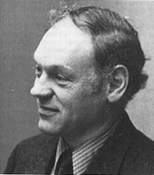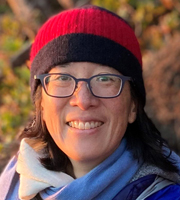About the P.W. Gast Lecture
This award is bestowed jointly by the EAG and the Geochemical Society and has been named in honor of Paul W. Gast, the first Goldschmidt medallist (the Goldschmidt award is bestowed by the Geochemical Society). This lectureship is awarded to a mid-career scientist for outstanding contributions to geochemistry. The lecture is presented as a plenary at the Goldschmidt Conference.
The selection of the lecturer alternates between the GS Board of Directors and the EAG Council depending on the location of the Goldschmidt Conference.
To be eligible, nominees must have received their PhD at least 10 years and no more than 25 years of full time equivalent research employ before the Goldschmidt conference at which the lecture is presented.
Nominations of underrepresented groups are encouraged.
We are committed to promoting the diversity of our awardees, to recognizing a wide range of different types of exceptional contribution, and we acknowledge the different career paths that lead to the achievement of such contributions.
The award is presented annually at the Goldschmidt Conference and consists in a certificate and an honorarium (1000 Euros).
About Paul W. Gast

Paul W. Gast (1930-1973)
During his career, Paul W. Gast pioneered the study of rare earth elements in examining the crust, mantle, and interior of the planet. He led the development of the use of rubidium-strontium and uranium-lead radiometric dating methods for rocks, particularly for samples returned from the Moon. His examinations of trace elements resulted in new understands of how volcanic fluids originate. Gast was the first recipient of the V.M. Goldschmidt Award.
Recipient of the 2023 P.W. Gast Lectureship:  Phoebe Lam
Phoebe Lam
University of California, Santa Cruz, USA
Phoebe Lam was presented the 2023 Paul W. Gast Lecture as a plenary lecture at the Goldschmidt2023 Conference.
The recording of the lecture, “Marine particle geochemistry: influence on biogeochemical cycles in the ocean“, can be viewed here.
Former recipients of the P.W. Gast Lectureship
Click on the Lecture Title to watch the lecture.
| Year | Name | Institution | Lecture title |
|---|---|---|---|
| 2022 | Vanessa Hatje | Universidade Federal da Bahia, Campus Ondina, Brazil | Rare Earth Elements: Tracers of Natural and Anthropogenic Processes Along the Continent-Ocean Continuum |
| 2021 | Sonja Aulbach | Goethe-University Frankfurt, Germany | Chemical geodynamics with eclogite |
| 2020 | Jochen Brocks | Australian National University, Australia | Lost World of Complex Life: Molecular Traces of our Deepest Eukaryotic Ancestors |
| 2019 | Carrie Masiello | Rice University, USA | New Synthetic Biology Tools to Track Microbial Processes in Soils and Sediments |
| 2018 | Caroline Slomp | Utrecht University, the Netherlands | Oxygen Loss In Coastal Waters: Impact on Geochemical Cycles |
| 2017 | Shuhei Ono | Massachusetts Institute of Technology, USA | Clumped Isotopologue (13CH3D) Fingerprinting of Methane Sources |
| 2016 | Shogo Tachibana | Hokkaido University, Japan | Chemical Evolution of the Solar System: Laboratory Experiments and Small-Body Explorations |
| 2015 | Ann Pearson | University of Harvard, USA | Organic Geochemical Proxies |
| 2014 | Tim Elliott | University of Bristol, UK | The Implications of a Non-Chondritic Terrestrial Mg Isotope Composition |
| 2013 | Sujoy Mukhopadhyay | University of California Davis, USA | Probing the Hadean World with Noble Gases |
| 2012 | Ros Rickaby | University of Oxford, UK | Tight coupling of life and metals throughout evolution |
| 2011 | Victoria Orphan | Caltech, USA | Microbial Partnerships and Methane-Oxidation in the Deep Sea |
| 2010 | Jérôme Chappellaz | University of Grenoble, France | Greenhouse Gases and their Isotopes in Firn Air and Ice Cores |
| 2009 | Ken Farley | Caltech, USA | Major events in the recent history of the solar system recorded by 3He in deep-sea sediments |
| 2008 | Jérôme Gaillardet | IPGP, France | Direct coupling between chemical and physical erosion rates in the West Indies |
| 2007 | Kate Freeman | PennState University, USA | Direct coupling between chemical and physical erosion rates in the West Indies |
| 2006 | John Eiler | Caltech, USA | Application of stable isotope geochemistry to elucidate processes and conditions on the Earth and other planets |
| 2005 | Eric Oelkers | CNRS Toulouse, France | Mineral Surface Reactivity from the Global to the Atomic Scale |
| 2004 | Peggy O’Day | UC Merced, USA | Cheeseburger in Paradise: Nutrients, Contaminants, and Cycling Across the Abiotic-Biotic Divide |
| 2003 | Hiroshi Ohmoto | PennState University, USA | Chemical and Biological Evolution of the Early Earth: A Minority Report |
| 2002 | Patricia Dove | Virginia Tech, USA | Deciphering the Physical Basis of Biomineralization through the Lens of Mineral Assembly |
| 2001 | Donald DePaolo | UC Berkeley, USA | Ca Isotope Geochemistry |
| 2000 | Jill Banfield | UC Berkeley, USA | |
| 1999 | Bernard J. Wood | University of Oxford, UK | Trace Element Partitioning: A Blunt Geochemical Instrument |
| 1998 | Everett Shock | Arizona State University, USA | |
| 1997 | Edouard Bard | Collège de France, France | Geochemical and Geophysical Implications of the Radiocarbon Calibration |

